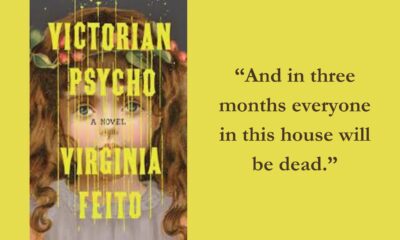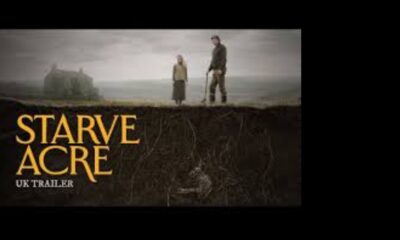
“Waste” by Eugene Marten
More Videos
Published
5 years agoon
By
Sarah MoonSparsity in Eugene Marten’s “Waste” creates a chillingly bleak atmosphere. In only 116 pages, Marten strings the reader through the daily life of a janitor, Sloper. His removal of others’ waste and his observations of the employees around the office are enthralling. Almost nothing happens in this novella, but the internal workings of the main character keep the reader mesmerized. Threads of story twirl around each other into a braid: Sloper cleans up after the businessmen at work, he finds the dead body of a woman and takes her to his home, he visits his neighbors – a woman in a wheelchair and her caregiver. All the moving parts of this narrative intertwine in ways that are unique and compelling. The palpable loneliness is in every word of this text.
Marten writes in such a minimalistic way that leaves emotion off the page and deep into the physicality of the text. The exclusion of emotion is what makes the novella so emotionally charged. Sloper is unphased by emotion and the responsibility to feel something is placed on the reader. This is unsettling and creates an atmosphere of worry and unease, paired with the subject matter of a huge thread of the story: the removal of a deceased female body from work to Sloper’s home. What ensues in this plotline is not for the weak-hearted. There are extremely intimate scenes between the Sloper and the dead woman. However, it is hardly ever explicit. These scenes build Sloper’s character and his need for companionship in whichever way possible. This is displayed also by his lack of mother figure and proposed marriage to the neighbor woman in the wheelchair later in the text. Palpable loneliness and desire for human connection are so deeply thematic in this text and it pains the reader. I felt bad for this character even through his dirty deeds.
Fiction. A spare and chilling account of the day-to-day experience of Sloper, a janitor in a big-city office building, WASTE explores the import of the discarded–for those who generate it, those who dispose of it, and those who are themselves discarded. From the humble prospect of his station, Sloper uncovers ominous possibility in lives he barely brushes. Brian Evenson says, “Only Eugene Marten can keep a reader enthralled with the minutiae of a janitorial existence…. Precisely and exquisitely detailed, WASTE is a stark little masterpiece.” And Dawn Raffel writes, “[P]itch-perfect. WASTE wastes nothing–not a syllable, a beat, a ragged breath.” And Sam Lipsyte writes, “There is nothing quite like the controlled burn of Eugene Marten’s prose.”
Goodsreads description
The multilayers of Sloper and his psyche are displayed in such interesting scenes that reveal certain characteristics. One of my favorites is his interaction with the neighbor woman in the wheelchair and her caregiver. Sloper meets both of them for the first time and fixates on the speech pattern of the caregiver. The woman in the wheelchair cannot speak, so the caregiver and Sloper are the only characters in the scene who can produce vocal sound. Sloper fixates on the fact that the caregiver speaks and answers his questions in four words or less. It becomes a game to Sloper. He tries to ask her questions that couldn’t possibly be answered in such few words and each time, she still does. The scene ends with Sloper giving up on his little game, only to have to last line be the caregiver saying “So, neighbor, do you come here often?” (35). Sloper had begun to realize the merits of the caregiver’s speech choices only for the scene to end with her bursting his bubble. Marten never has to say anything explicitly, but character is built heavily in these types of scenes.
This is a text that I could read many times and glean something new from it every time: a new underlying concept or emotion in the characters, a new minimalistic writing technique, a new dynamic to the main character. This is truly a horrifying, minimalistic masterpiece. Ultimately, Sloper is a necrophiliac sociopath who observes others in a cold manner. This is the story of a disturbed being that is nuanced and brilliant. This was a strong five star read for me. Plot, writing, character – all done perfectly.
Sarah Moon is a stone-cold sorceress from Tennessee whose interests include serial killers, horror fiction, and the newest dystopian blockbuster. Sarah holds an M.A. in English Literature and an M.F.A. in Fiction Writing. She works as an English professor as well as a cemeterian. Sarah is most likely to cover horror in print including prose, poetry, and graphic forms. You can find her on Instagram @crystalsnovelnook.

You may like
Book Reviews
The Hotel: We’ll All Be There Soon.
Published
3 weeks agoon
March 17, 2025By
C M ReidDaisy Johnson’s, The Hotel is a collection of stories that tell the tale of a hotel built on cursed land. Originally written and recorded as a series for BBC Radio 4 in 2020, (you can find the recordings here https://www.bbc.co.uk/programmes/m000mrcg/episodes/player )
The fourteen-story collection was released in hardcover in 2021. Johnson’s prose is haunting, weaving together the stories of generations of families who have been tempted, forced, or serendipitously dumped at The Hotel. Most leave the message, “I’ll be there soon,” and many disappear from room 63.
- ‘The British literary heir to Stephen King’ Johanna Thomas-Corr, Sunday TimesA triumph of contemporary horror from the Booker Prize-shortlisted author, this collection of short stories will haunt you long after you turn the final pageA place of myths, rumours and secrets, The Hotel looms over the dark Fens, tall and grey in its Gothic splendour
- Built on cursed land, a history of violent death suffuses its very foundations –yet it has a magnetism that is impossible to ignore
- On entering The Hotel, different people react in different ways
Last update on 2025-03-17 / Affiliate links / Images from Amazon Product Advertising API
The Plot.
The Hotel tells the stories of the people who are drawn to The Hotel, or, more accurately, the ground the hotel is built on. The first story explains what we know about the hotel, its tendencies, moods, and … hobbies. We are then introduced to Mary Southgraves, ‘The Witch’, who comes to live with her husband on the land on which The Hotel will be built. The villagers in the pond drown her for predicting a sickness that takes the village children, (no this is not a spoiler she tells you she dies on the first page of her chapter.)
The proceeding chapters build upon this story. We meet the workers who are brought in to fill the pond to begin construction. A child of a guest in 1968 who meets another girl who may or may not actually be there. A maid who takes part in séances and Ouija board sessions. The stories progress through time into the present.
Highlights.
The haunting prose of The Hotel does the majority of the heavy lifting for this collection, which makes sense since it began as a podcast series. Johnson’s prose leans towards poetry, albeit more Poe than Keats.
The repetition of specific characters and family names throughout the different stories was intriguing, giving the stories links. These links trigger a sense of recognition for the reader. There is also a sense of anticipation, knowing what has happened to these families already, we wonder how much more they can withstand. The Hotel is like a curse following these families, but I think Johnson is commenting on lineage and the consequences of past actions. The sins of the father and all that.
- Fifteen highly original and darkly unsettling supernatural stories, performed by some of Britain’s finest actresses ‘This is what we know about The Hotel
- It is bigger on the inside than on the outside
- Do not go into Room 63
Last update on 2025-03-17 / Affiliate links / Images from Amazon Product Advertising API
Drawbacks.
These stories can get confusing at times and I think this is due to the briefness of the stories. It’s hard to keep track of a character that you have spent four pages with and remember them three stories later. I found myself having to stop and turn back to check if that person was who I thought they were. This pausing to turn back interrupts the reading experience. It pulls you out of the story and destroys the atmosphere that Johnson has worked to create.
The Final Take.
The Hotel was an interesting read. Johnson is a talented writer who has published a collection of linked stories that will keep the reader turning pages if only to find out the final fate of these families. That being said, it is obvious that the stories were initially written for a podcast. I’m not sure if it’s the way they are put together or… I don’t know, there’s just something ‘podcasty’ about them. As such I would recommend listening to the audio episodes (see the link above) over reading the book.
 (3 / 5)
(3 / 5)
On Halloween in 2016 Josh Malerman, author of Bird Box, released A House At The Bottom Of A Lake (gosh this is a hefty title!). Last week, I picked this slim book up off my library’s Adult Horror shelves, not knowing what to expect. What I got was a novella that should have been shelved in the teen lit section. Perhaps it is the rather weird underwater sex scene that precludes it from those shelves.
- From the New York Times bestselling author of Bird Box and Malorie comes a haunting tale of love and mystery, as the date of a lifetime becomes a maddening exploration of the depths of the heart
- “Malerman expertly conjures a fairy tale nostalgia of first love, and we follow along, all too willingly, ignoring the warning signs even as the fear takes hold
- ”—Lit Reactor The story begins: young lovers, anxious to connect, agree to a first date, thinking outside of the box
Last update on 2025-03-10 / Affiliate links / Images from Amazon Product Advertising API
The Plot.
When James asks Amelia out on a date during summer break, canoeing was the last thing that she expected. Borrowing his uncles canoe, James hopes he can show Amelia an exciting time, because he really likes this girl! The date starts well and the conversation, if stilted at times, is banter-ey and cool.
They head out on the first lake, but James has an idea that they might have a better time on the lake that joins to this one. It is quieter, no speed boats to show him up, they’ll be able to eat their picnic lunch in peace and quiet. When they arrive, though, they notice a tunnel, that may lead to a third lake. Eager to show Amelia that he is an exciting kind of guy, James heads through the tunnel.
Lo and behold, it is another lake! Albeit, a bit murky and deserted, but that’s alright. That is until they notice that beneath the bow of the boat is a tiled roof. Beneath that tiled roof is a whole house. What ensues is a summer of falling in love and exploring a sunken house that may not be as empty as they thought.
Highlights.
Malerman writing the internal monologue of an angsty seventeen-year-old on a first date is one of the most authentic things I’ve read for a long time. Even down to James worrying about revealing that his dad owns the hardware shop he works in. Scared that Amelia will think that is all he is going to do with his life.
The ending (which of course I cannot discuss here) was well done, although a little contrived and predictable. It felt as if it had been almost tacked on the end as an afterthought. Perhaps Malerman finished the story without the final chapter, but was encouraged to add that last bit to give readers some closure
- “A book that demands to be read in a single sitting, and through the cracks between one’s fingers
- There has never been a horror story quite like this
- Josh Malerman truly delivers
Last update on 2025-03-10 / Affiliate links / Images from Amazon Product Advertising API
Drawbacks.
Malerman is a good writer, we have seen this in the many novels he has released since Bird Box. A House At The Bottom Of A Lake did not meet the usual standard. There are many reasons I say this. The first is a lack of creativity in descriptive passages in this book. They all felt pretty drab and began to become repetitive by the end of the story. I don’t know how many, times Malerman compared the way that James and Amelia were moving under the water in their scuba suits as ‘Astronaut-like’ or ‘Astronaut-esque’ or ‘ Like he was walking without gravity’, but really can you find another comparison please because this one is all used up!
As I mentioned in the intro, this did feel like a YA novel. Not only because both of the main characters are seventeen, but the prose is a too simple to be engaging. A House A The Bottom Of A Lake might be marketed differently in Australia (where this humble reviewer lives), perhaps making it to the YA shelves in the US or UK, but this is definitely not adult horror.
The Final Take.
Josh Malerman is a favorite of mine. I tend to pick up his books, blurb unread, because I will generally enjoy what he is putting out there. The exception to this rule is A House At The Bottom Of A Lake (if I never have to type that title again I will be pleased!). It just didn’t hit the way his other novels have and I was disappointed.
 (2 / 5)
(2 / 5)
Imagine this. You’re home alone, waiting for your partner to return, when you hear a knock on your door. You answer it to see a family of five, bundled up against the cold. The father, a kindly older gentleman, explains that he used to live in this house as a boy. And he would love to show it to his family.
Do not let them in.
The story
Released in June 2024, We Used To Live Here is author Marcus Kliewer’s debut novel. It tells the story of Eve, who just purchased a beautiful house with her partner, Charlie. Their plan is to flip the house and sell it.
One night, while waiting for Charlie to come home, Eve is surprised by a knock at the door. It’s a man named Thomas Faust and his family.
Thomas explains that he grew up in the house and hasn’t been in the area in years. Would Eve let them in so that he can show the home to his children?
Against her better judgment, Eve lets them in. She regrets this almost at once when Thomas’s daughter vanishes somewhere into the house.
What worked
I always appreciate a book that allows you to play along with the mystery. And this book does that better than just about any other I’ve seen.
Pay close attention to the chapters, to the words that aren’t there. To everything about this novel.
This is mostly down to Kliewer. This is ultimately his work of art. But the production value is also fantastic. I don’t want to ruin the multiple mysteries, so I’ll just say this. There are clues in this book that require some specific artistic choices in the page layouts in this book. And I loved that.
If you’d like to experience another horror book review, check out this one.
We Used To Live Here is also the kind of story that makes you question everything right along with the main character, Eve. Eve is a great main character. But she might be an unreliable narrator. She might be experiencing every single horror described, exactly as it’s described. Or, she might be having a psychotic breakdown. Through most of the book, we can’t be sure. And that is so much fun.
Finally, the weather plays a large part in this story. There are several stories in which the weather or the land itself could be considered a character. Even an antagonist. This is certainly one. The winter storm is the thing that traps the family in the house with Eve. It also makes escaping the home difficult. Reading this book during the winter was especially impactful. Most of us know what it feels like to be shut in by a storm. I’ve personally lived through some of those storms that are just referred to by their year, as though they were impactful enough to claim the whole 365 days for themself. And that was with people I liked. Imagine what it would feel like with strangers. It’s a staggering thought and one that we explore in depth in this book.
- Get Out meets Parasite in this eerily haunting debut and Reddit hit—soon to be a Netflix original movie starring Blake Lively—about two homeowners whose lives are turned upside down when the house’s previous residents unexpectedly visit
- As a young, queer couple who flip houses, Charlie and Eve can’t believe the killer deal they’ve just gotten on an old house in a picturesque neighborhood
- As they’re working in the house one day, there’s a knock on the door
Last update on 2025-03-08 / Affiliate links / Images from Amazon Product Advertising API
In the end, We Used To Live Here is a fantastic book. It’s the sort of story that sneaks into your brain and puts down roots. And if this is just the first book we’re getting from Kliewer, I can’t wait to see what else he comes up with.
 (5 / 5)
(5 / 5)















